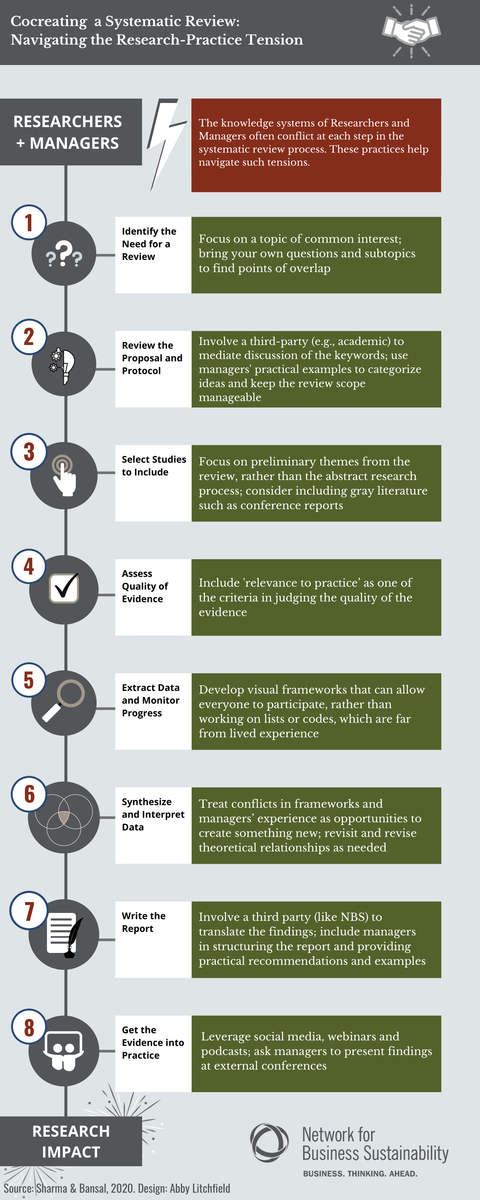For researchers to offer practical advice for managers, we need to change the way we research. We suggest a new approach.
There isn’t a researcher among us who hasn’t mastered (or is trying to master) abstract ideas and rigorous methods. We learn these as the basics of our discipline and profession.
But this focus often means that researchers stand apart from their eventual audience throughout the research process, until we are ready to share ideas more broadly. By that point, the ideas have often become impenetrable to anyone outside our discipline: especially lay people, like managers, we often want to affect.
In our quest for impact, researchers frequently end up “translating” ideas at the end of our research process. This late effort to achieve relevance is an add-on; it could lose meaning and compromise potential impact.
For some time, the authors of this article (Garima and Tima), have been smitten by this puzzle. We have wanted to figure out how researchers can make their research simultaneously rigorous and relevant.
We have uncovered one answer in moving away from the traditional focus on theory and abstraction to emphasize concrete insights, sometimes drawing on lived experience.
This approach allowed us to provide practical (but rigorous) guidance on a research process we see as a powerful path to impact: systematic reviews co-created by researchers and managers.
How We Changed Our Research Practice
True to our discipline and profession, we had ‘researched’ how researchers can have greater impact. We examined how the Network for Business Sustainability (NBS) used systematic reviews to bring together researchers and managers to produce knowledge on topics of mutual interest.
We were thrilled that the Academy of Management Journal (AMJ) accepted our article for publication. It was only when we tried to write an article for researchers in Organizational Research Methods (ORM) about methods for co-creating knowledge through systematic reviews that we had an epiphany.
Moving from abstraction to concreteness
Researchers have become so comfortable with abstract ideas, that they, including we, even talk about impacting managers in abstract ways. We talk about how to close the research-practice gap, the difference in institutional norms, the different knowledge systems.
When writing our AMJ article, we did the same. As a result, we presented a theoretically rich framework that helps researchers understand how knowledge is co-created.
Yet, we knew that this framework wouldn’t likely change the way that researchers and managers worked together. The abstract terms didn’t offer enough practical guidance for researchers.
So, when a call for a Special Issue on literature reviews at ORM came out, we saw a chance to present our data in a different way.
In the resulting article, we analyzed our data not to lead to abstract concepts, but in terms of how it could guide research practice to have more impact on management practice. We wanted our ORM paper to inspire researchers to involve managers in systematic reviews, so as to produce knowledge that impacts practice.
Lessons for Changing Research Practice to Impact Management Practice
How did we produce an article that offers practical yet rigorous guidance to researchers? Here’s a bit of the story,
We moved beyond research templates
In the Organizational Research Methods article, we wanted to move beyond abstract ideas and offer concrete insights into research practice. But maybe unsurprisingly, our first draft was still too abstract. We presented our insights in the traditional template of qualitative research. We started with prior theory, showed our findings, and then tried to extend theory in the discussion. We presented a distance from our data, even though we both had lived experience with the topic. For example, Tima had designed NBS’s co-creative process of systematic review; Garima had participated in the process as a project manager for one of the projects.
Fortunately for us, the Special Issue Editor, Jean Bartunek, unshackled us from these templates and asked us to write what we thought researchers would find useful. At first, we were uncomfortable in this space. But, ultimately it felt more authentic. We integrated insights from our lived experiences to enrich the guidance we offered.
We started with the end in mind
Researchers often start with a research question and then embark on the research journey, instead of thinking about what the output would look like if they answered the question. But there’s value to asking early on: Who will use our work and what will they find most meaningful?
In our case, our focus shifted to what researchers (conducting systematic review) will find most useful. Our focus shifted halfway through the review process, but we encourage researchers to start their research projects with the end in mind.
We engaged different media
Research insights without dissemination are like expensive jewels that no one wears.
We wanted to take our ideas one step further than the ORM article. So, we are mobilizing these ideas through our video, above, and infographic, below. Our goal was to speak to researchers, much like researchers try to speak to managers.
In a subsequent NBS article, we will share more about the process of creating these outputs so you may find another path toward impact, one which takes your brilliant ideas and puts them into the hands of the user.

The infographic based on our article is a handy guide to research cocreation (click to download).
Read the Articles
Sharma, G., & Bansal, P. 2020. Partnering up: Including managers as research partners in systematic reviews. Organizational Research Methods.
Sharma, G., & Bansal, P. 2020. Cocreating rigorous and relevant knowledge. Academy of Management Journal, 63(2).
About the Authors
Garima Sharma is an Assistant Professor at the Andrew Young School of Policy Studies, Georgia State University. Her research focuses on how businesses can solve the social and environmental problems we face today. She studies how business and its decision makers act, think, and organize to manage the tension in social and profit goals.
She also sees researcher-manager collaboration as an important piece of the sustainability puzzle. In her research, she asks how research and practice communities bridge their differences to generate knowledge related to intractable social and environmental issues.
Tima Bansal is a Professor of Strategy at the Ivey Business School. She is also the Founder of the Network for Business Sustainability.
She has received significant accolades for her scholarship in business sustainability: most recently, in 2017, she was presented with the Organizations and Natural Environment Distinguished Scholar Award by the Academy of Management, and in 2012, she was awarded a Canada Research Chair to pursue her efforts to make business both profitable and sustainable. Her research targets the interplay between business strategy and sustainability.




Add a Comment
This site uses User Verification plugin to reduce spam. See how your comment data is processed.This site uses User Verification plugin to reduce spam. See how your comment data is processed.